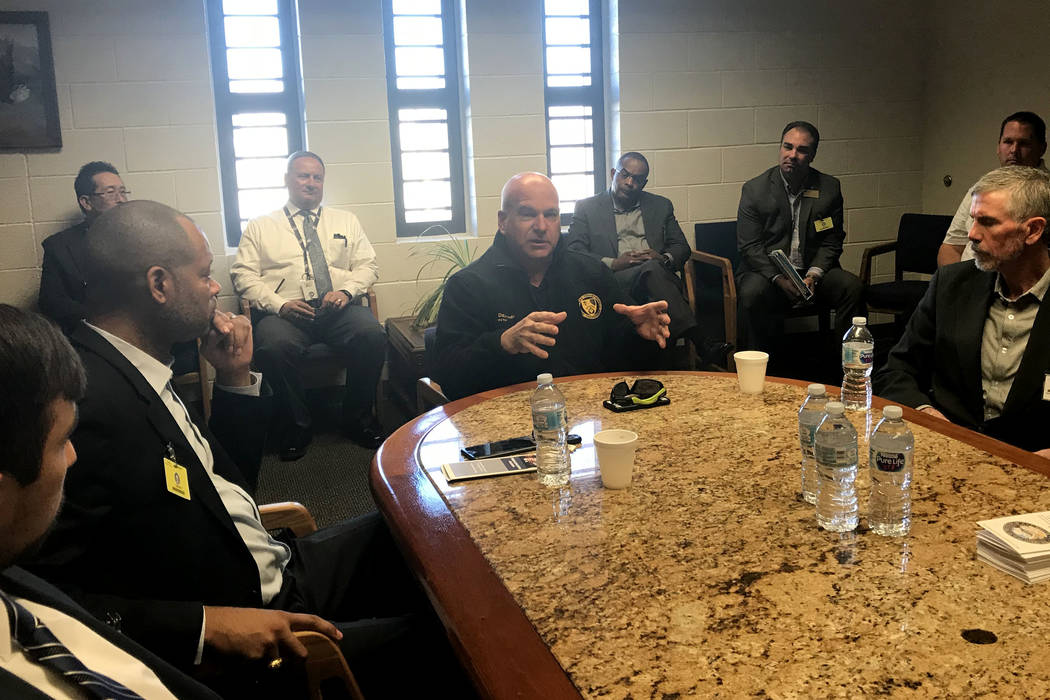Pilot prison program helps Nevada inmates with education, new lives

Jeff Caraballo doesn’t want to nickel and dime his way through life anymore.
So he’s trading in his Department of Corrections number for a student identification card.
“I’ve been a hustler on the streets my whole life,” Caraballo said. “It’s time to finally grow up.”
The 35-year-old inmate at the High Desert State Prison in Indian Springs is one of 25 prisoners hoping education can give them new life after incarceration. They’re part of a pilot prison education program created in 2017 by the Nevada Legislature.
The College of Southern Nevada is spearheading the education of the inmates, who have been given the choice between two tracks: vocational training or college readiness.
“It will give me a life I’ve never had before,” Caraballo said.
With his hair slicked back, and dressed in shiny white sneakers and his prison-issue jean pants and shirt, Caraballo shared his story Friday from inside the prison.
In 2008, he fell into a serious meth addiction that led to a revolving door in and out of prison. His current stint stems from a burglary conviction.
Scheduled for release on June 22, the father of seven wants to build upon the college credits that he’s earning and complete an associate of arts degree at CSN. From there, he wants to earn a bachelor’s degree in psychology.
“It’s been a tremendous help,” Caraballo said of the program. “It’s put me in the right direction.”
Caraballo and eight other inmates shared similar stories Friday with a contingent of higher education officials and Senate Majority Leader Aaron Ford, who was a major proponent of the law that launched the program.
“I’m an old man in here,” 53-year-old Eric Erwin told the group. “I’ve squandered a lot of opportunities. This is the only turning point I’ve ever made in my life.”
Students in the program take an academic and life success course to start. The course teaches strategies for mastering academic and life success, including goal setting, time management and personal responsibility. An oral communication course is the next class for those who want to go on to college.
CSN professor Kevin Mitchell said he holds the inmates to the same standards he does students on CSN campuses. Above and beyond asking students to complete assignments, Mitchell said the program is changing hearts and minds.
Ford shared similar sentiments.
“I stand here with goose bumps,” said Ford, who is also running for state attorney general. “You have made Senate Bill 306 worthwhile.” (The 2017 bill established the program.)
Craig von Collenberg, director of apprenticeship studies and safety programs at CSN, said the program has done amazing work so far. But the true test will come after the prisoners are released. To help with that, the college has forged community partnerships, with groups like Hope for Prisoners, to ensure that the inmates have support outside of prison.
Jon Ponder, founder and CEO of Hope for Prisoners, said he’s received a commitment from Laborers Union Local 872 to help fast track the vocational students into careers. Inmates on the college readiness track are being paired with CSN advisers.
The same number of women prisoners are also being educated at the Florence McClure Women’s Correctional Center. The pilot program will continue with a new group of 50 prisoners this fall. Officials say they hope it will become a permanent item in future state budgets.
“I want to see you guys succeed,” Ford said. “A lot of us believe in you. A lot of us want to see you make it.”
Caraballo said he recognizes the need to heed those words. Upon release, he’ll not only be working on his educational goals, but on the goal to remain in recovery.
“I have to work at it every day,” he said. “I have to keep my support group strong, and trust in people who want to help. I can’t do it on my own anymore.”
Contact Natalie Bruzda at nbruzda@reviewjournal.com or 702-477-3897. Follow @NatalieBruzda on Twitter.